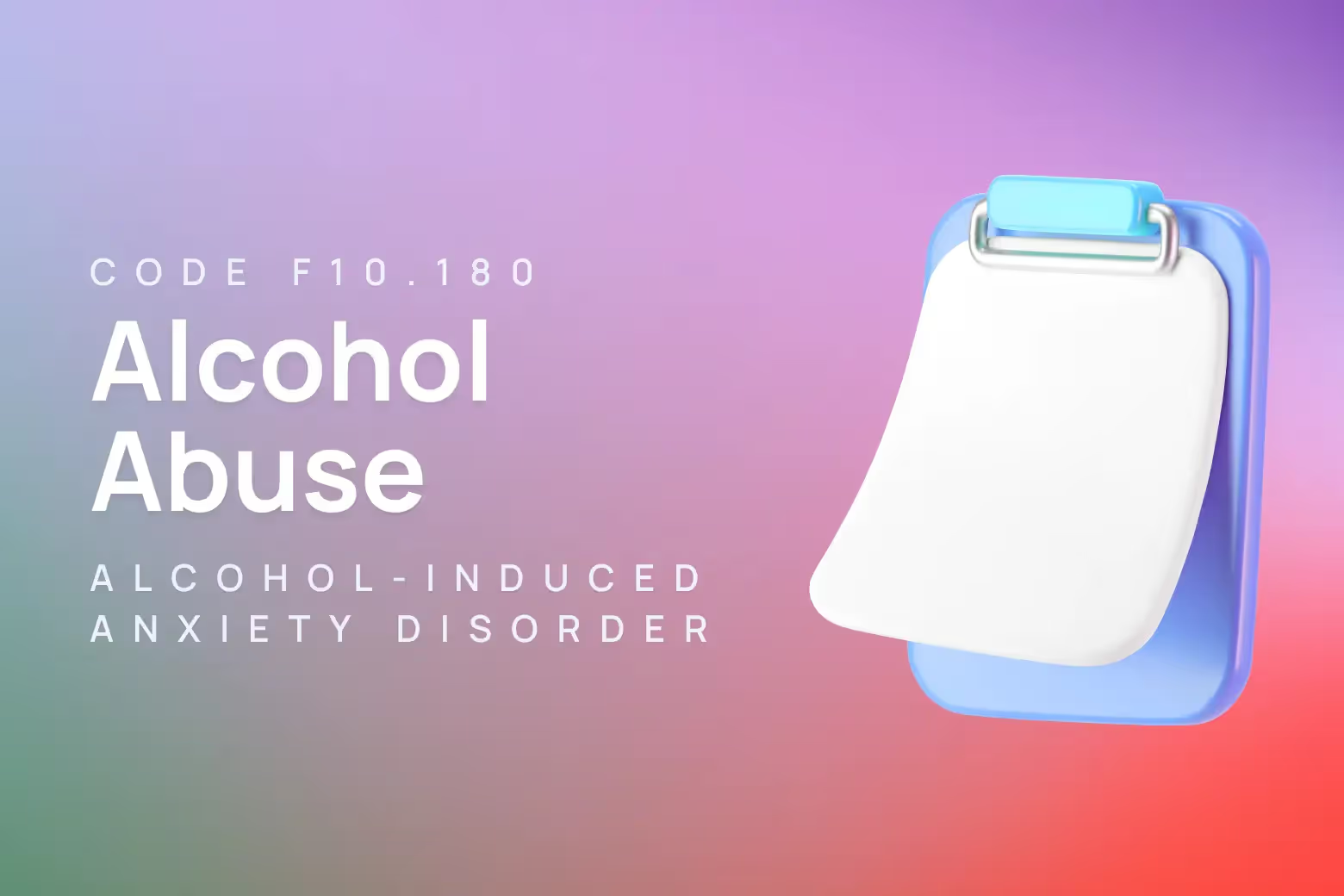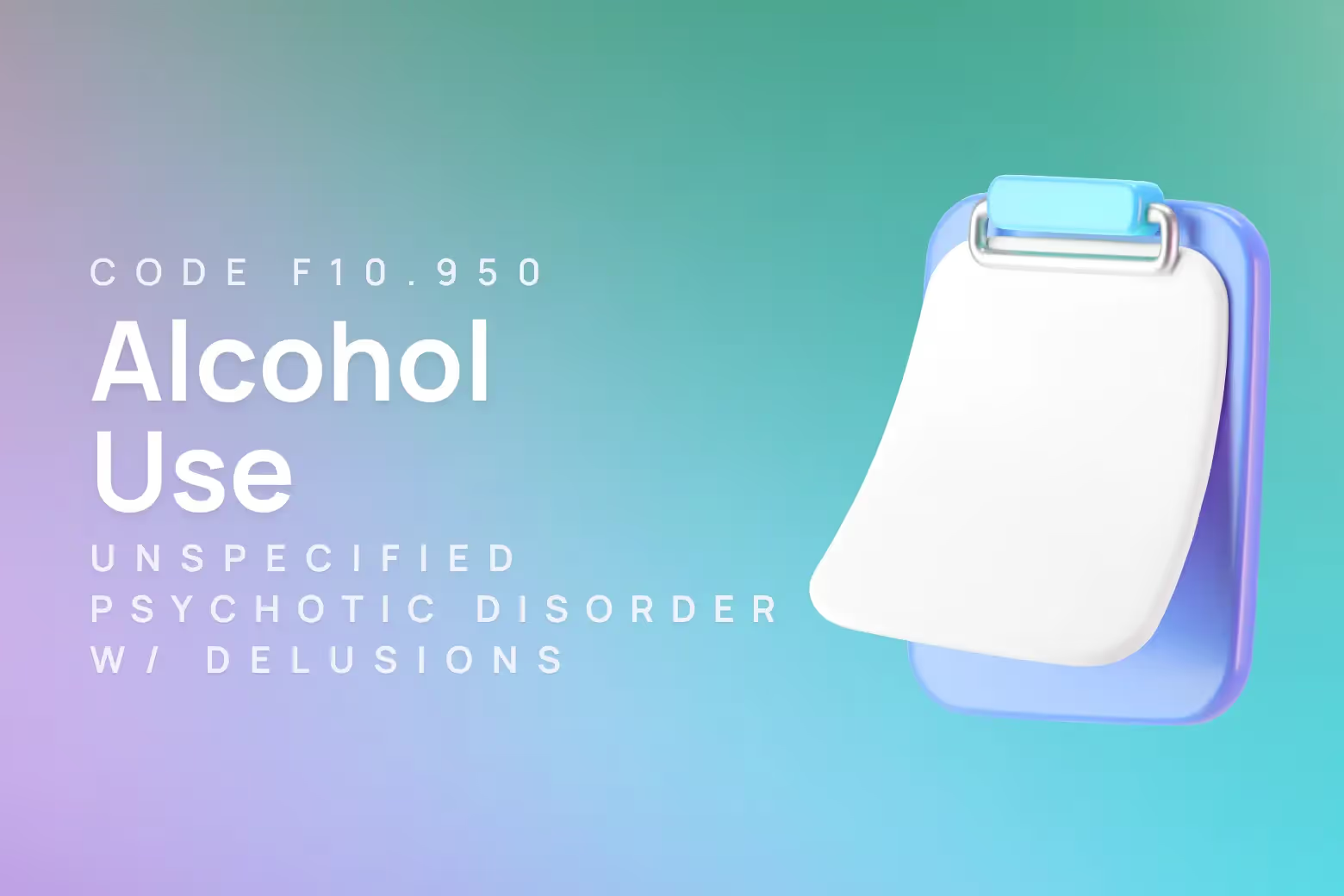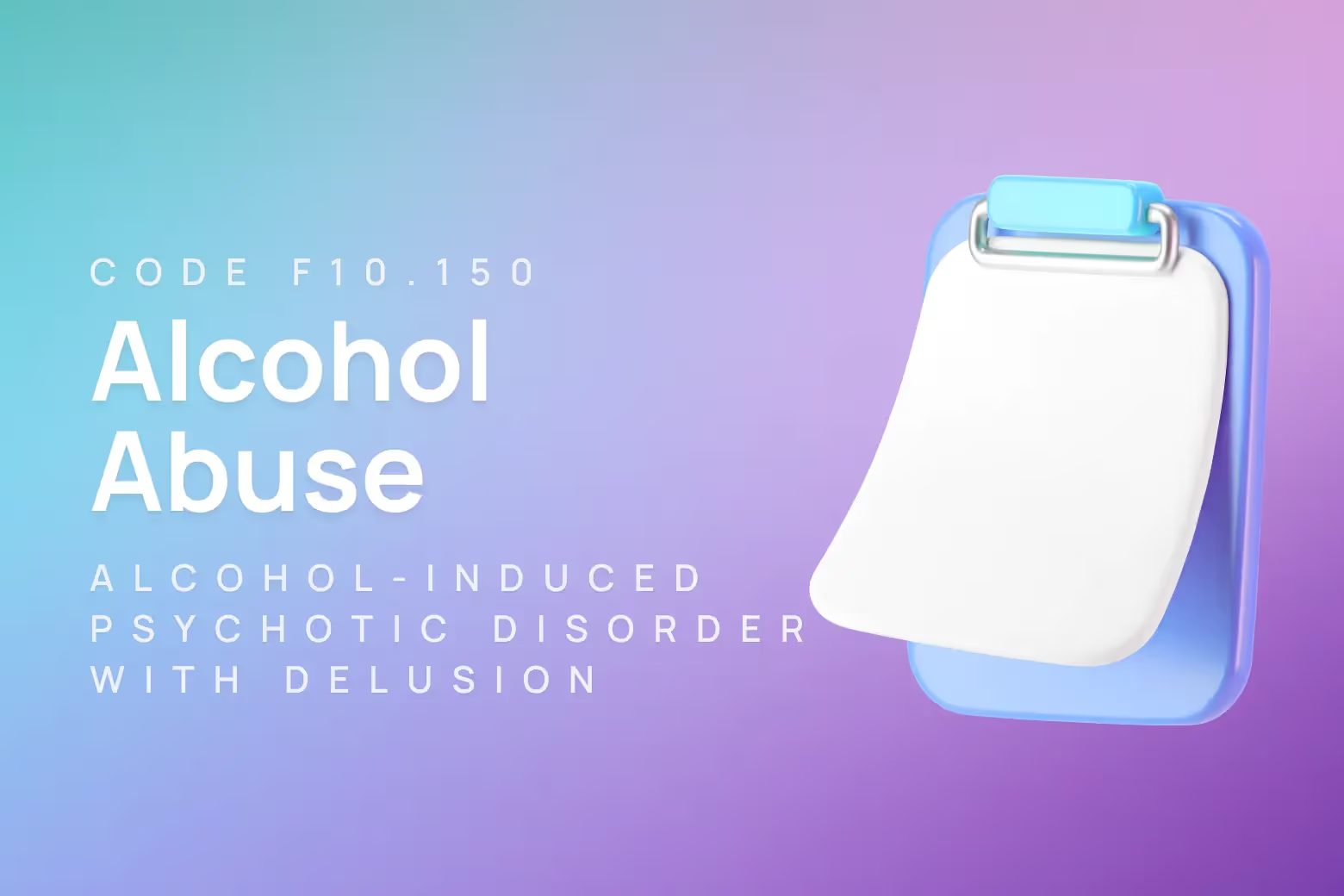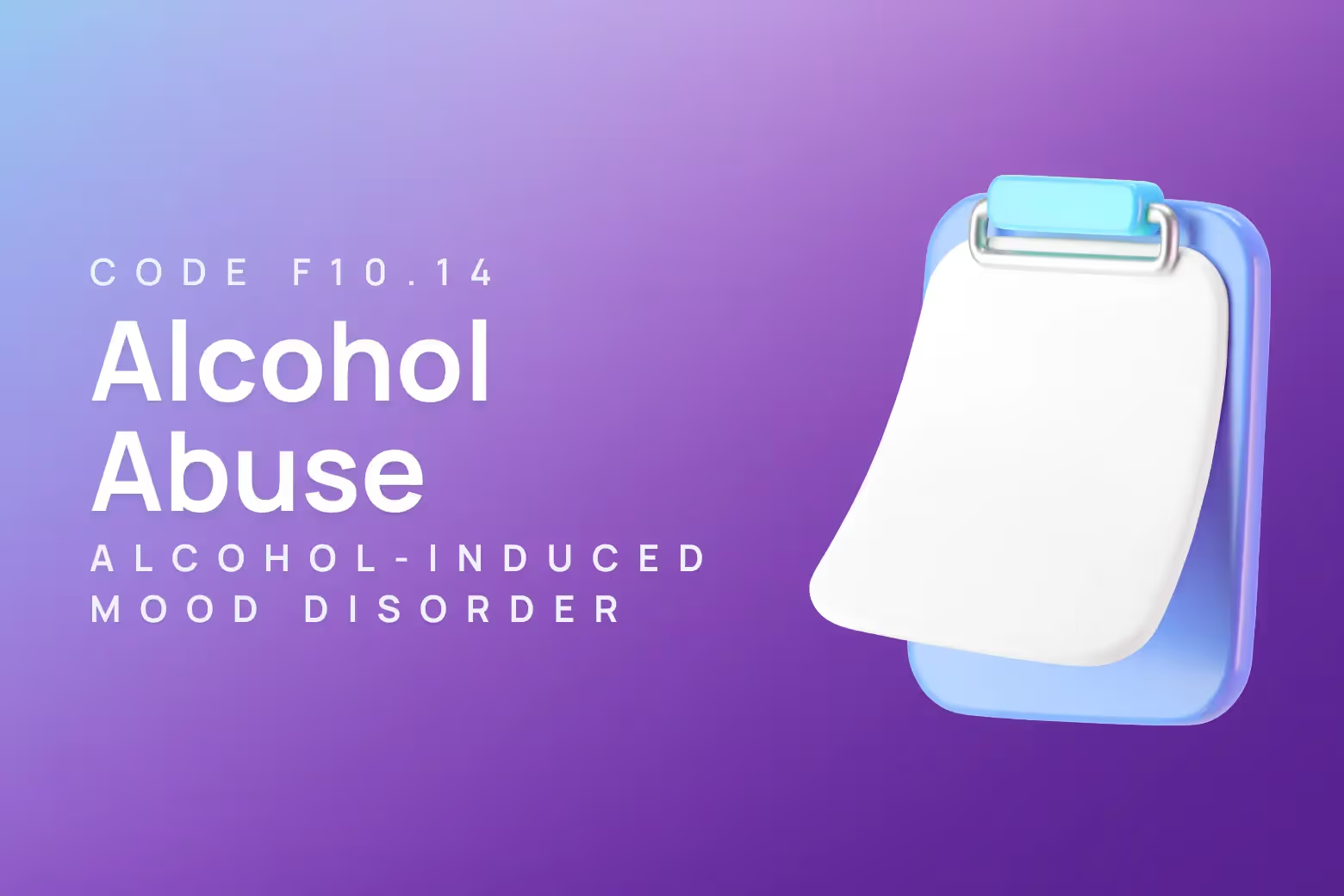ICD-10 code for alcohol abuse with alcohol-induced anxiety disorder

F10.180 is the ICD-10 code for alcohol abuse with alcohol-induced anxiety disorder.
This diagnostic code identifies clients who meet criteria for alcohol abuse alongside anxiety symptoms that directly result from alcohol consumption patterns.
Accurate coding helps clinicians document the complex relationship between substance use and mental health presentations.
Key features:
- F10.180 ICD-10 code documents alcohol abuse pattern with comorbid anxiety symptoms caused by alcohol use
- Requires meeting specific criteria for both alcohol abuse and anxiety manifestations
- Distinguished from primary anxiety disorders by temporal relationship to alcohol use
- Critical for treatment planning that addresses both substance use and anxiety symptoms

Diagnostic criteria for alcohol abuse with alcohol-induced anxiety disorder (F10.180)
F10.180 represents a dual presentation where clients meet criteria for alcohol abuse while experiencing anxiety symptoms directly related to their drinking patterns.
The diagnosis requires careful assessment to establish that anxiety symptoms emerge during or shortly after alcohol use periods.
Alcohol abuse presents as a problematic drinking pattern that leads to significant impairment or distress within a twelve-month period.
Clients demonstrate continued alcohol use despite recurring negative consequences across multiple life domains.
The diagnostic assessment must establish clear evidence of:
- Meeting minimum criteria for alcohol abuse patterns (at least 2-3 symptoms from standard criteria)
- Presence of anxiety symptoms that emerge during periods of alcohol use or withdrawal
- Temporal relationship between drinking episodes and anxiety symptom onset
- Anxiety symptoms that exceed normal stress responses or adjustment reactions
- Impairment in social, occupational, or other important functioning areas
- Symptoms not better explained by independent anxiety disorder or other medical conditions
When to use F10.180 diagnosis code
Differential diagnosis requires distinguishing alcohol-induced anxiety from independent anxiety disorders and other alcohol-related conditions.
The key clinical consideration involves establishing temporal relationships between drinking patterns and anxiety symptom emergence.
F10.180 vs F10.10 (Alcohol abuse, mild)
F10.10 captures alcohol abuse without comorbid mental health symptoms.
Use F10.180 when clients present with both alcohol abuse patterns and anxiety symptoms that directly correlate with drinking episodes.
The anxiety component must represent more than typical withdrawal symptoms or hangover effects.
F10.180 vs F41.9 (Anxiety disorder, unspecified)
Primary anxiety disorders exist independently of substance use patterns and often predate alcohol problems.
F10.180 applies when anxiety symptoms emerge specifically during or after drinking episodes, resolve during abstinence periods, and lack the persistent quality typical of independent anxiety disorders.
Clinical assessment should examine whether alcohol serves as a coping mechanism for pre-existing anxiety versus creating anxiety symptoms through its physiological effects.
F10.180 vs F10.188 (Alcohol abuse with other alcohol-induced disorder)
F10.188 covers other alcohol-induced mental health conditions beyond anxiety. Choose F10.180 specifically when anxiety represents the predominant alcohol-induced mental health presentation, rather than depression, sleep disorders, or sexual dysfunction.
Related ICD-10 codes
- F10.18 - Alcohol abuse with other alcohol-induced disorders
- F10.181 - Alcohol abuse with alcohol-induced sexual dysfunction
- F10.182 - Alcohol abuse with alcohol-induced sleep disorder
- F10.188 - Alcohol abuse with other alcohol-induced disorder
Interventions and CPT codes for alcohol abuse with alcohol-induced anxiety disorder
Individual psychotherapy approaches
Evidence-based individual therapy forms the foundation of treatment for clients with F10.180.
Cognitive behavioral therapy techniques help clients understand connections between drinking patterns and anxiety symptoms while developing alternative coping strategies.
Relevant CPT codes include 90832 (30-minute sessions), 90834 (45-minute sessions), and 90837 (60-minute sessions).
Session length selection depends on clinical complexity and client needs for processing both substance use and anxiety management strategies.
Screening and brief intervention services
Structured screening identifies alcohol use severity and anxiety symptom patterns during initial assessments.
Brief intervention techniques help clients recognize relationships between drinking and anxiety while motivating behavior change.
CPT code 99408 covers 15-30 minute screening and brief intervention sessions for commercial payers, while G0396 applies to Medicare beneficiaries.
Extended sessions exceeding 30 minutes use 99409 (commercial) or G0397 (Medicare) codes (CPT codes alcohol abuse.txt).
Group therapy interventions
Group therapy provides peer support while addressing both alcohol abuse patterns and anxiety management techniques.
Clients benefit from shared experiences and group accountability for maintaining sobriety while managing anxiety symptoms.
CPT code 90853 covers group psychotherapy sessions that focus on substance abuse recovery combined with anxiety symptom management strategies.
Family therapy approaches
Family therapy addresses relationship dynamics that may contribute to both alcohol abuse and anxiety symptoms.
Sessions help family members understand addiction processes while supporting recovery efforts.
CPT codes 90846 (family therapy without client) and 90847 (family therapy with client present) support comprehensive treatment planning that includes family system considerations.
How Upheal improves F10.180 ICD-10 documentation
Suggesting appropriate ICD-10 codes based on session content
Upheal's clinical documentation platform analyzes session notes to identify patterns consistent with alcohol abuse and anxiety symptom presentations.
The system recognizes key clinical markers that support F10.180 coding decisions, including temporal relationships between drinking episodes and anxiety symptoms.
This automated analysis helps clinicians capture diagnostic complexity while maintaining coding accuracy.
Maintaining HIPAA-compliant records with proper diagnostic coding
Documentation for F10.180 requires careful attention to both substance use patterns and mental health symptom tracking.
Upheal provides secure, encrypted storage for sensitive clinical information while ensuring diagnostic codes align with documented clinical presentations.
The platform maintains audit trails that support clinical decision-making processes and regulatory compliance requirements.
Reducing administrative burden so you can focus on client care
Complex dual diagnoses like F10.180 demand extensive documentation to support treatment planning and billing accuracy.
Upheal automates routine documentation tasks, allowing clinicians to concentrate on therapeutic interventions that address both alcohol abuse and anxiety symptoms.
This improved efficiency supports better client outcomes through increased focus on direct clinical care.
Supporting clients with alcohol abuse with alcohol-induced anxiety disorder
Treatment planning for F10.180 requires integrated approaches that address both substance use patterns and anxiety symptom management simultaneously.
Clinicians must consider how alcohol withdrawal may temporarily worsen anxiety symptoms while building alternative coping strategies.
Early treatment phases often focus on stabilization and safety planning before progressing to deeper therapeutic work.
Assessment protocols should distinguish between alcohol-induced anxiety and independent anxiety disorders through careful timeline analysis and symptom monitoring during abstinence periods.
Many anxiety symptoms resolve naturally as clients maintain sobriety, though some individuals require ongoing anxiety management strategies.
Effective documentation platforms like Upheal support comprehensive treatment planning by tracking symptom patterns over time and suggesting appropriate diagnostic codes based on clinical presentations.
Try Upheal's clinical documentation platform to see how automated note-taking can improve your diagnostic accuracy while reducing administrative time, allowing you to focus on providing quality care for clients with complex presentations like F10.180.













